Wondering if your feline friend, or pet parents, can partake in the juicy delight of strawberries just like you do?
Strawberries, with their tantalizing aroma and bright red appearance, can certainly catch the attention of your curious cat.
But can cats eat plain strawberries without any issues?
Well, the short answer is yes, cats can indeed have strawberries, but there are a few things you should consider before sharing your berry stash.
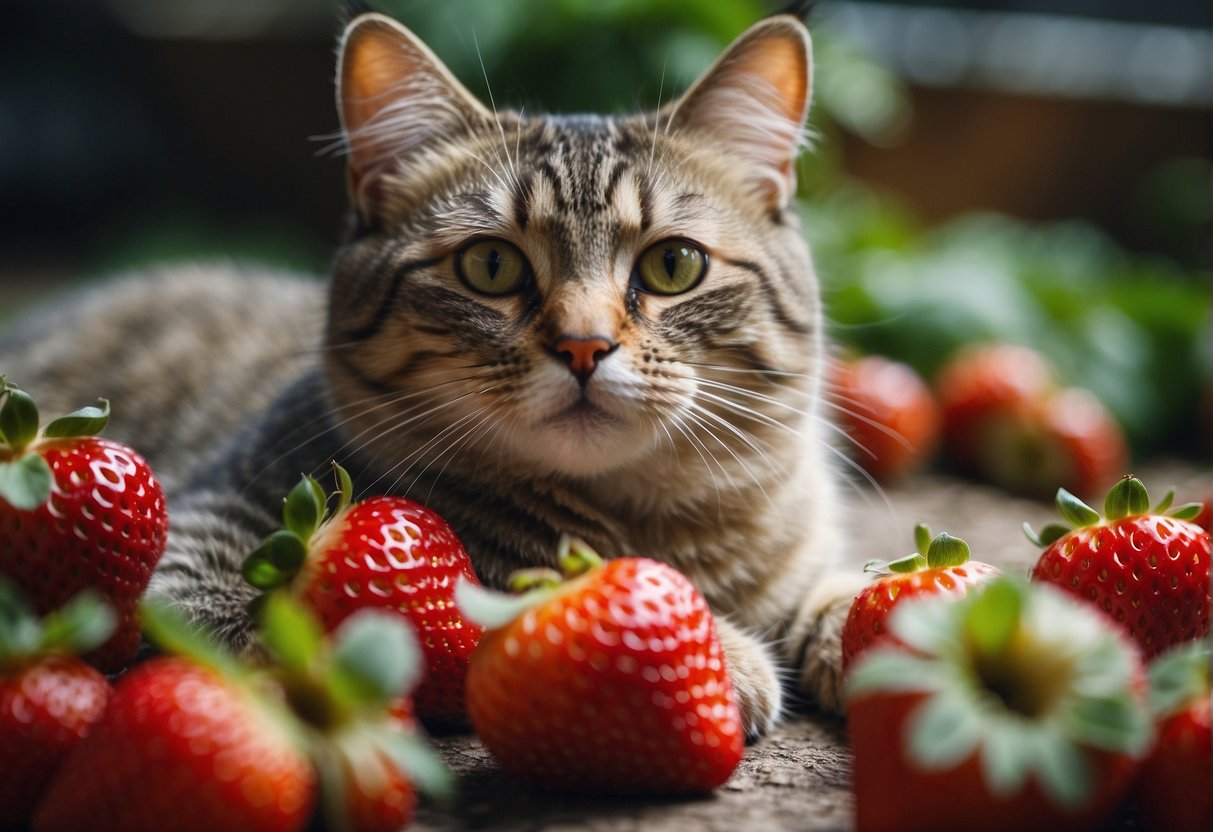
Unlike humans, cats are obligate carnivores, so their main source of nutrition comes from protein-rich animal products.
While the occasional berry won’t hurt, strawberries don’t offer much in terms of nutritional value for cats’ nutritional needs.
However, it is important to be cautious when feeding your cat strawberries and to ensure they are given in moderation.
Key Takeaways
- Cats can safely eat strawberries in moderation, and remember that cat needs a meat-based treat.
- Strawberries offer no significant nutritional benefits to cats.
- Always remove the stem and wash the fruit before offering it to your cat.
Nutritional Analysis of Strawberries for Cats
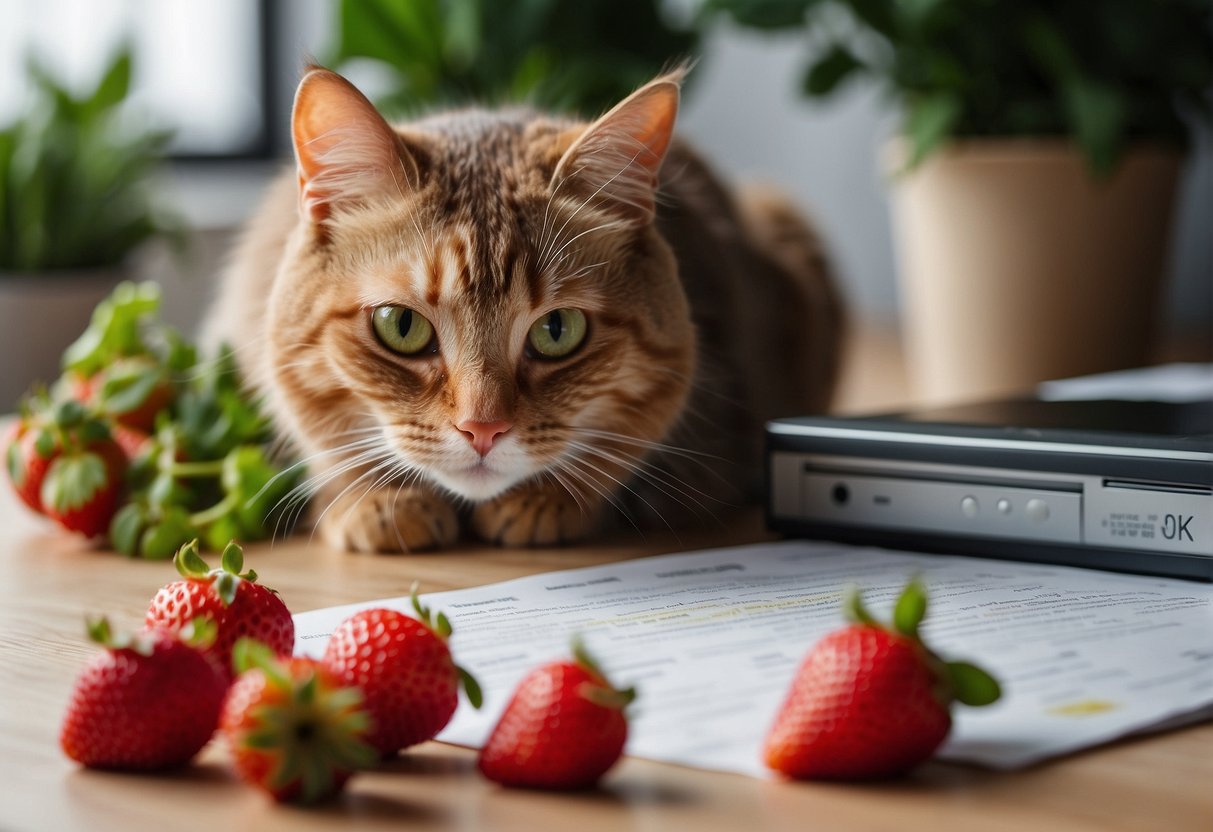
Have you ever noticed your cat eyeing up your snack, especially if it’s something as vibrant and juicy as a strawberry?
Let’s dig into whether these red delights are a yay or a nay for your furry friend.
Essential Nutrients in Strawberries:
- Vitamins:
Strawberries are a good source of vitamins like vitamin C, which is known for its antioxidant properties, and vitamin K, which plays a role in blood clotting. (1) - Minerals:
These berries also contain minerals such as manganese, essential for many of your cat’s bodily functions. - Fiber:
A decent fiber content can aid in digestion.
However, remember that strawberries also pack some sugar, which cats don’t need in their diet.
Cats are obligate carnivores, which means their bodies are designed to process meat, not fruits.
Health Implications for Cats:
In moderation, the antioxidants in strawberries might support brain and heart health. Plus, they bring along a touch of fiber for digestive health.
Despite the potential upsides, it’s important to consider these risks:
- Sugar Content:
Too much sugar can lead to obesity and diabetes in cats. - Allergies and Intolerances:
While rare, some cats might develop an intolerance or even an allergy. (2) - Digestive Issues:
Too many strawberries might cause gastrointestinal upset, like vomiting or diarrhea. (3)
With this fruity analysis, you’ve got the lowdown on occasional strawberry as a treat for your cat.
Just remember, everything in moderation and keep an eye on your kitty for any adverse reactions.
Happy snacking (for both of you)!
Safe Feeding Practices
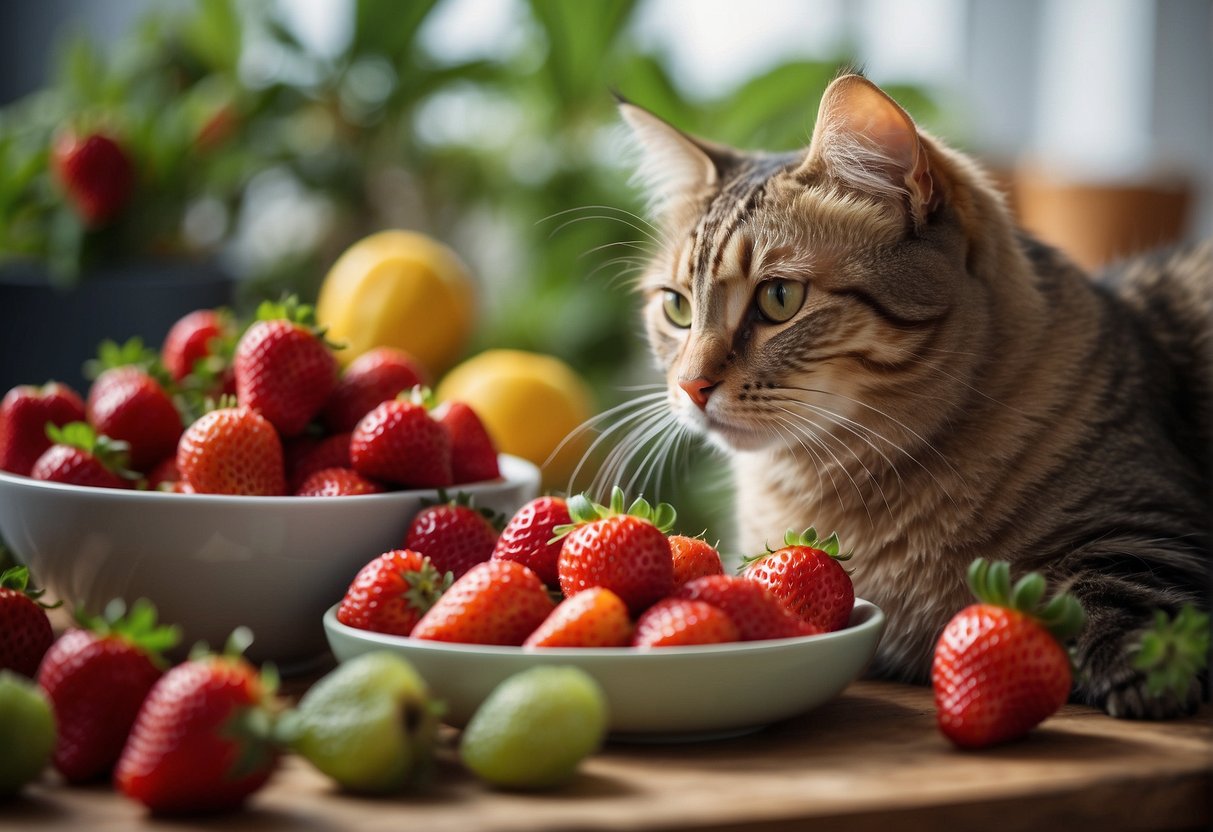
Are you considering sharing your strawberry snack with your feline friend? Here’s how to do it safely:
How to Serve Strawberries to Cats
- Wash the strawberry thoroughly to remove any pesticides or dirt.
- Remove the stem and leaves to avoid any gastrointestinal obstruction they might cause.
- Cut the strawberry into small, manageable pieces to prevent choking.
- Serve a small piece to your cat as a treat, not a meal replacement.
Remember, moderation is key. Strawberries contain natural sugars and should only be an occasional treat. A slice or two is plenty!
Recognizing and Managing Allergies
Just like us, cats can have allergies. Keep an eye out for symptoms such as:
- Itching or excessive scratching
- Swelling around the mouth or throat
- Vomiting or diarrhea
If you notice any of these after feeding strawberries to your cat, it’s time to visit the vet. They will provide the best course of action and might recommend an allergy test.
Just a quick tip: Always introduce new foods slowly. It helps you monitor your cat for any adverse reactions. Happy and safe snacking!
Understanding Cats’ Dietary Preferences
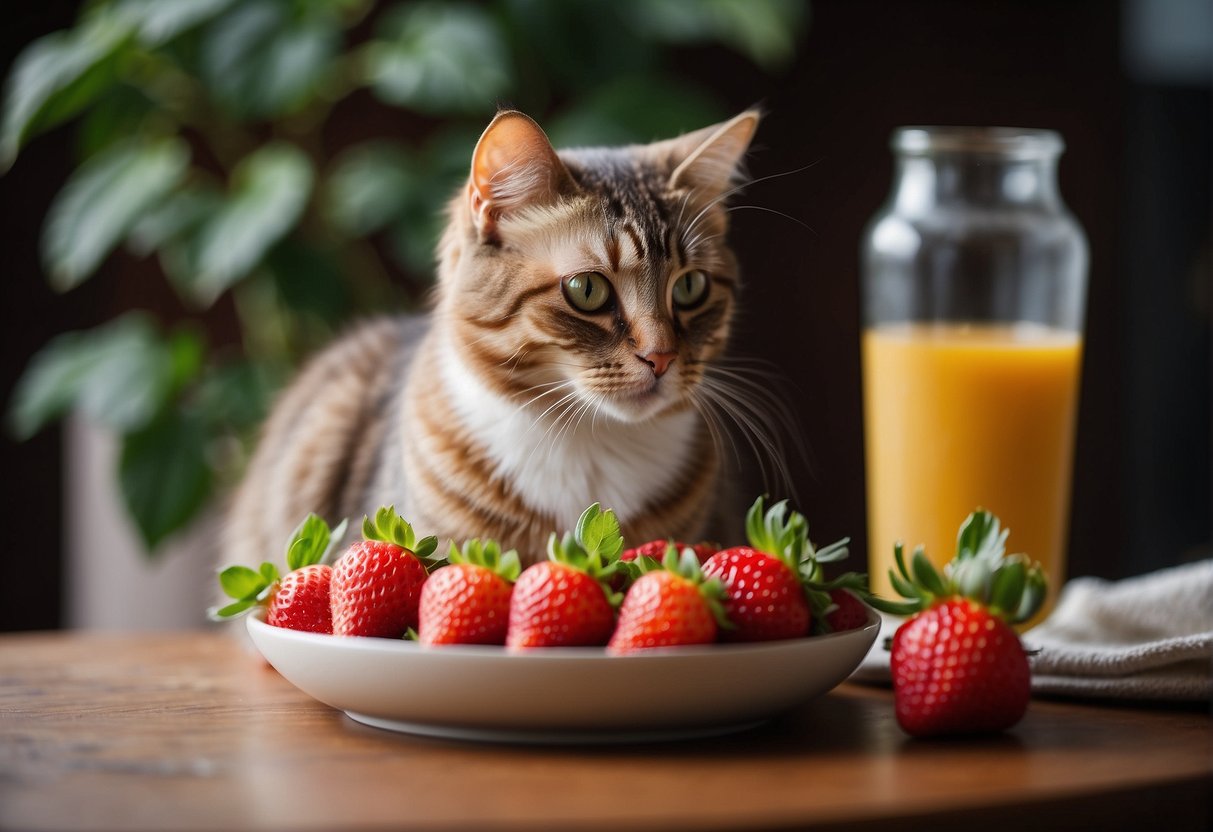
Cats and strawberries—it sounds like an unlikely duo, doesn’t it?
I mean, given their reputation as obligate carnivores, why would cats give those sweet red berries a second glance?
While strawberries can be a safe treat in moderation, it’s essential to remember that a carnivore cat diet, focusing on high-protein animal sources, is crucial for maintaining your feline’s health and nutritional balance.
It turns out, your feline friend might just be curious about strawberries, not because they need them, but because, hey, why should you have all the fun?
Their keen sensory experience might draw them to the fruit’s bright color and interesting smell. (4)
Do Cats Naturally Like Strawberries?
Alright, let’s be real—no cat is out there prowling for a bush of strawberries in the wild.
They might not crave it like they do their kibble or a nice piece of salmon, but every now and then, a cat might take a nibble out of sheer curiosity or because they’re attracted to the fruit’s texture.
Healthy Alternatives to Strawberries
Got a snack-happy kitty? Before you share your fruit basket, keep in mind that moderation is key.
Here’s a quick list of some safe alternatives for the occasional treat:
- Melon: A slice of cantaloupe or honeydew can be a hydrating snack.
- Apples: Just make sure to remove the core and seeds first.
- Blueberries: Tiny, but packed with nutrients.
Every treat you offer should be a tiny part of your cat’s diet, which should be a balanced diet rich in proteins and taurine—a must-have for a cat’s heart and eye health.
Remember, it’s always best to consult with your vet before introducing new foods to your kitty’s menu to ensure a balanced diet.
After all, what’s most important is keeping them purring and thriving!
Expert Insights and Veterinary Perspectives
Dr. Paola Cuevas, a veterinarian, highlights, “Cats can indeed nibble on strawberries in moderation.” Strawberries aren’t toxic to cats and can be offered as an occasional treat.
But remember, cats are obligate carnivores, so fruit shouldn’t replace their regular diet.
Why would your feline friend even want strawberries?
Cats don’t have sweet taste receptors like we do – the interest might be due to the fruit’s texture or moisture content.
Strawberries consist of 91% water, making them a hydrating option on a hot day but certainly not a substitute for fresh water.
It’s interesting to note that strawberries contain vitamin C, potassium, and fiber, although cats typically get all the nutrients they need from their meat-based diets.
Strawberries: A Tiny Treat!
- Offer in moderation
- Wash thoroughly
- Chop to prevent choking
- Keep an eye out for any allergies
| Nutrient | Benefit for Cats | Strawberry Content |
| Water | Hydration | 91% |
| Fiber | Digestive Health | Low |
| Vitamin C | Antioxidant | Low for Cats’ Needs |
| Potassium | Muscle Function | Minimal |
Remember, variety is the spice of life, but stability is key for your cat’s diet. When in doubt, consult your vet about introducing new treats to your feline’s menu.
Stay informed and your kitty will thank you with purrs of contentment!
Engaging Readers with Interactive Content
To help you digest the info, we might whip up a cute infographic, highlighting the do’s and don’ts of sharing strawberries with your cat, including how they can help relieve constipation and prevent abdominal pain.
The fiber and sweetness in strawberries, as well as raisins, is both soluble and insoluble, both of which regulate intestinal function to improve digestion for cats.
Strawberries are low in calories, have moderate sugar content, and provide important vitamins and minerals such as Vitamins A, B6, and C, as well as Manganese, Folate, Potassium, and Magnesium, all of which are important for our nervous systems.
Remember, while they are non-toxic, strawberries should only be given:
- In moderation
- As an occasional treat, not a dietary staple
- Ensuring no allergic reactions follow their consumption
How about a little test of your purr-ent knowledge?
Which of these is the main component of a cat’s diet?
- Protein
- Sugars
- Vitamins
- Strawberries
Cats need a protein-rich diet, and while a strawberry might make them purr with a little excitement, it’s more a delight than nutrition for them.
To further engage, why don’t you drop a comment below with your fluff ball’s favorite treat? It’s a fantastic way to share wisdom with fellow cat enthusiasts!
| Strawberry Fact | Detail |
| Safe in Small Amounts | A tiny slice is enough for kitty |
| Sugar Content | High – not great for your cat’s health |
| Frequency of Feeding | Only as a rare treat |
| Health Benefit | Minimal – better stick to cat food |
Keep those sugary snacks to a minimum, and let’s ensure our kitties stay as healthy and vibrant as possible. (5)
Remember, everything they eat should purr-vide real benefits!
Quick Recap
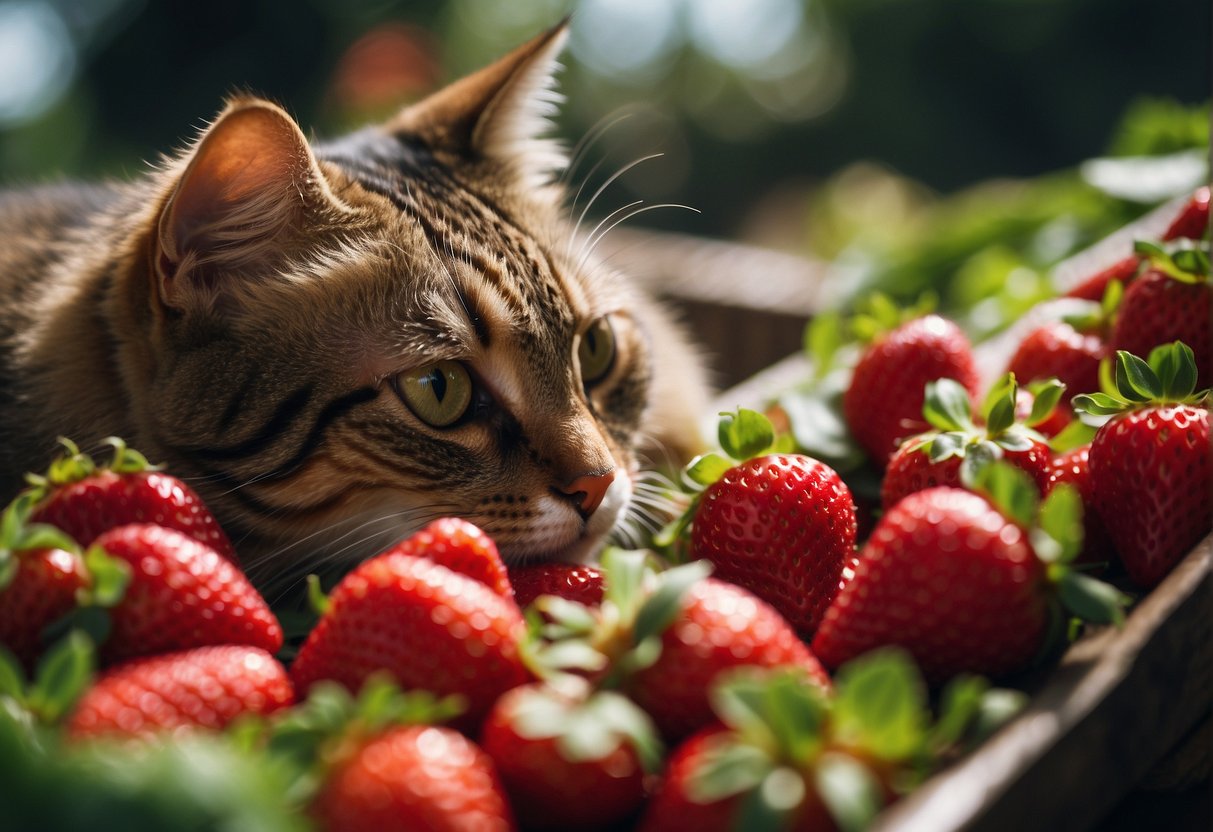
Hey there! Wondering if your feline friend can nibble on strawberries?
You’re in luck—the answer is a berry positive yes! Kittens, being the most likely to explore and try a novel food like this, and it should be safe to allow a kitten to try them.
The largest concern would be that they could choke on it, so cut it small enough so that even if they swallow it whole, they won’t choke. Strawberries are not toxic to cats and can be a sweet little treat for healthy kittens.
Just remember, moderation is key. A slice or two of citrus fruits is fine, but don’t make it a regular part of their diet to avoid any potential issues with ingestion of large quantities.
- Safe in Small Amounts:
Your cat can safely eat strawberries in small portions. - Vitamin C:
Strawberries contain vitamin C which isn’t necessary for cats, but a little vitamin boost occasionally won’t harm. - Potential Risks:
Some cats may have allergies or intolerances, leading to stomach upset or skin issues. - Not a Substitute:
Strawberries can’t replace the meats and vitamins a cat needs.
| Are Strawberries Nutritious for Cats? | Can Cats Have an Allergic Reaction? |
| Not particularly. Few benefits for cats. | Yes, although rare. Watch for symptoms. |
Latch onto “http://Can Cats Eat Strawberries? – Cats.com” for a holistic view on strawberries in a cat’s diet.
Remember, while strawberries are a pawsitive thumbs up for cats now and then, they should only be a tiny part of their overall diet.
Always monitor your cat for any strange reactions post-strawberry snacking, and when in doubt, consult your vet. Keep it as a rare treat, not part of the daily menu!
Remember to follow the 10% rule when it comes to cat treats and snacks, ensuring that they do not make up more than 10% of their diet, including a small piece of strawberry.
Additionally, even though strawberries are safe for healthy cats, you should avoid feeding them processed strawberry products like jams, syrups, ice cream, and yogurt, which may contain artificial sweeteners that are toxic to cats and pose a potential choking hazard.
Feel free to pounce into those articles for all the juicy tidbits on feeding strawberries to your kitty companion.
Frequently Asked Questions

Navigating the do’s and don’ts of feline diets can be quite a picky business, can’t it?
Fear not, here’s a quick dive into some common questions cat owners have when it comes to the idea of sharing strawberries with their furry companions.
Are strawberries safe for cats to eat?
Yes, strawberries are safe for your cat to nibble on.
They’re not toxic, so a small treat here and there won’t harm them.
How many strawberries can I safely feed my cat?
Moderation is key — think a tiny piece as a treat.
Overdoing it may upset your cat’s stomach, so it’s best to stick to one or two small pieces occasionally.
What are the nutritional benefits of strawberries for cats?
Strawberries offer fiber, vitamin C, potassium, manganese, and antioxidants.
Plus, their high water content can be a source of hydration.
But remember, cats primarily need protein, so fruits should only be a small part of their diet.
Can strawberries cause allergies in cats?
Just like humans, cats can be allergic to anything.
If you notice any unusual symptoms after feeding them strawberries, stop and consult your vet.
How should I prepare strawberries for my cat?
Wash them thoroughly to remove any pesticides or chemicals.
Offering a small, chopped piece or a light mash can make it easier for your cat to eat.
Are there any risks associated with feeding strawberries to cats?
Sure, there are risks with any food. Too many strawberries can lead to stomach upset or contribute to obesity and diabetes due to their sugar content.
Always feed strawberries — and any treat — in moderation.
- No Account Gambling Enterprise: The Future of Online Gambling - August 2, 2025
- Introduction to Free Slots Machines: The Ultimate Guide - August 2, 2025
- Как вывести деньги с Lucky Jet: подробное руководство - August 1, 2025

